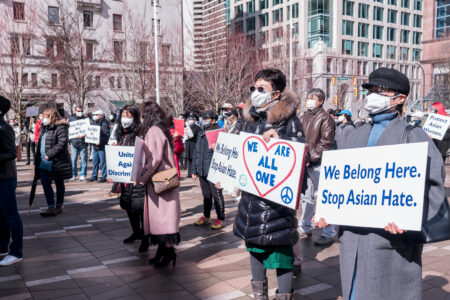
(This article has been translated from French.)
This text is written in the context of the United Nations 2015-2024 International Decade for People of African Descent. Over the past 20 years, the Black Canadian population has doubled in size, from 573,860 in 1996 to 1,198,540 in 2016.
Black Canadians now represent more than 3.5 percent of the total Canadian population and 15.6 percent of the visible minority or racialized population. According to Statistics Canada’s population projections, the Black population will continue to grow and could represent between 5 percent and 5.6 percent of the Canadian population by 2036. One of the peculiarities of Black communities in Quebec and Canada is that they tend to be a disproportionately young population. Indeed, in 2016, the median age of the Black population was 29.6 years, while it was 40.7 years for the general population.
People of African descent in Canada and Quebec are highly concentrated in large urban centres such as Toronto, Montreal, Ottawa-Gatineau, Edmonton and Calgary.
Black Canadians, including young people, generally face above-average unemployment. The unemployment rate for Black Canadians is around 12 percent, while the average for non-Blacks is 5 percent. Among Black youth aged 15 to 24, the unemployment rate is twice the average for young Quebeckers and young Canadians as a whole. Born in Canada or having immigrated at a young age, these Black youths have educational backgrounds that are equivalent to those of other young Quebeckers and Canadians of French or British origin. Yet their chances of being employed are lower. In addition to the disadvantages associated with young age, such as lack of working experience and training, young people from racialized communities also have to deal with being perceived as different. The integration of ethnic minorities, especially “racialized minorities,” into the labour market and other spheres of society remains problematic.
The notion of a “racialized group,” or a “racialized minority” (which seems more appropriate to me), refers here to a process of racialization and indicates the attribution of racial significance to relations that have been unclassified or uncharacterized on a racial basis at an earlier stage. Thus, the term “racialized group” is generally applied to groups with a precise civic and national identity that are also the targets of racism. It should be noted that the Employment Equity Act uses the concept “visible minority,” which designates in the Act “persons, other than Aboriginal people, who are non-Caucasian or who do not have white skin.”
Let us recall that the perpetuation of systemic discrimination and its reproduction represents a significant obstacle for victimized groups. These problems also have a negative impact on society as a whole, including social and human costs.
To highlight the seriousness of this issue, the United Nations Working Group of Experts on People of African Descent said in a 2017 report on the situation of Blacks in Canada that anti-Black racism stems from a “history of slavery, racial segregation and marginalization.”
Organizations at the forefront of issues and challenges faced by Black Canadians
The National Black Canadians Summit, held by the Michaëlle Jean Foundation, the Federation of Black Canadians and the Somali Centre for Family Services, in collaboration with a variety of community organizations, called for urgent measures to address issues facing Black Canadians. One of the key initiatives emerging from the Summit was the establishment of a national strategic action plan to provide a real roadmap, so communities can work with governments and the private sector to resolve these problems. This strategic action plan is unequivocally part of the International Decade for People of African Descent. It is the Canadian version of the UN Programme of Activities for the Decade (which calls on all UN Member States to adopt an action plan for the Decade). An important outcome of the strategic mobilization generated by the Summit was that Prime Minister Justin Trudeau officially recognized the International Decade in 2018.
In addition, for the first time in Canadian history, the 2018 federal budget explicitly allocated funding to Black communities (to support Black youth, to conduct research on mental health in Black communities, and to working with Statistics Canada to obtain disaggregated data on Black communities in Canada, etc.). The mobilization of Black Canadians from across the country at the 2019 Summit, together with the Canadian International Decade Strategic Action Plan, led to meetings with several federal ministers. These targeted and strategic meetings contributed to the awarding of an increase in the amounts allocated specifically to Black communities in the 2019 federal budget. In recognition of the UN International Decade for People of African Descent, the 2019 federal budget has allocated $25 million over five years, starting in 2019-20, which is a real step in the right direction.
In Quebec, the Sommet socioéconomique pour le développement des jeunes des communautés noirs (SdesJ) (Black Youth Socio-Economic Development Summit) and the International Black Economic Forum (IBEF) are focusing on initiatives that can advance socio-economic development and job creation within the province’s Black communities.
The SdesJ seeks to help make the Quebec government’s youth strategy more coherent and foster synergies of practice in communities, advocating a structured and holistic approach to the empowerment of Black communities. It wants to encourage joint funding of government, community, and civil society projects and initiatives. In contrast, IBEF promotes entrepreneurship and investment as key drivers of wealth in Black communities. Entrepreneurship is at the heart of its strategy, which focuses on the economic empowerment of Black populations. In particular, the organization proposes “pragmatic solutions to the economic matters facing Black people” by mobilizing various stakeholders involved in key issues and challenges, acting as a catalyst for Black economic advancement.
These organizations call for concerted and sustained work with the various levels of government ─ municipal, provincial and territorial, and federal ─ to more accurately evaluate the situation of people of African descent across Canada and develop public policies and government programs that can contribute to tangible and measurable results for Black Canadians.
The full participation of people of African descent: A major challenge for Quebec and Canada
Black Canadians continue to face serious disadvantages. They are less likely to have access to gratifying jobs in strategic management positions. More often than not, they are relegated to less favorable positions in the public service and the private sector. Are these concentrations of decision-making power “the prerogative of a relatively homogeneous segment of the population? Is the composition of these strategic places of power representative of the Quebec and Canadian population, characterized by great ethnocultural diversity?” The difficulties that come with the fact of being Black and of being repeatedly confronted with structural discrimination and racism, in the workplace and in other spheres of activity, create a deep democratic malaise and social injustice, which must be named so that it can be rectified structurally and permanently.
A true democracy requires institutions and ways of functioning to offer open access to all individuals so they can participate in the various spheres of activity (social, political, economic and cultural).
That is why promoting the full participation of Black Canadians in the various spheres of administrative power is to work toward modernizing, even legitimizing, our democracy, by re-examining the foundations of a just and equitable society. It is fundamental, in this sense, to pay particular attention to current standards and practices that obstruct the achievement of this desirable outcome.
Photo : Shutterstock by SFIO CRACHO.
Do you have something to say about the article you just read? Be part of the Policy Options discussion, and send in your own submission. Here is a link on how to do it. | Souhaitez-vous réagir à cet article ? Joignez-vous aux débats d’Options politiques et soumettez-nous votre texte en suivant ces directives.









